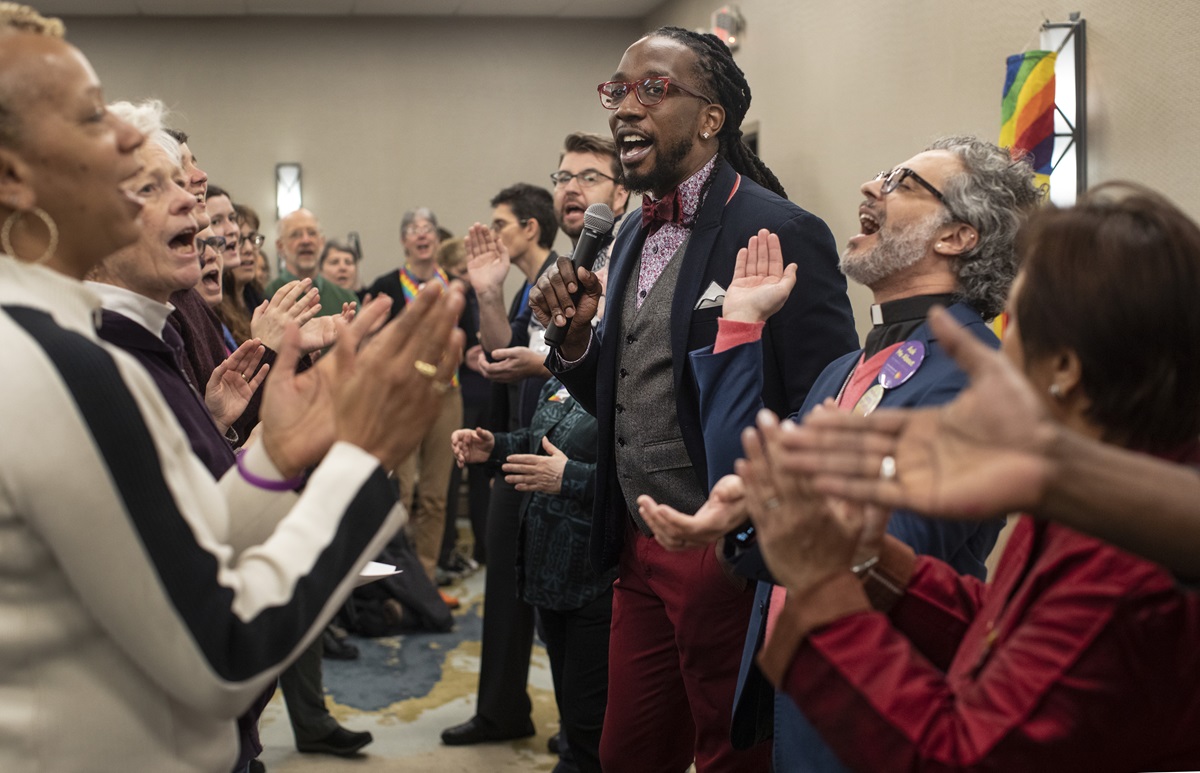As the opening of the 2019 General Conference loomed, a handful of openly gay delegates talked about legislation and more with fellow allies of full inclusion for LGBTQ people in The United Methodist Church.
Called “Conversation at the Crossroads,” the Feb. 22 town hall event attracted a standing-room-only crowd of about 160 to a St. Louis hotel conference room, with some 4,000 others joining by livestream.
Some attending wore “With, Not About” stickers, underscoring their view that a legislative gathering called to address the denomination’s long, divisive conflict over homosexuality ought to have LGBTQ United Methodists in the center of the discussion.
The town hall represented a kind of preemptive strike — making sure such voices led the way in at least one forum.
“We want to place in the archives a witness here today, that we’re here in St. Louis, and that we have something to say,” said the Rev. Jay Williams, who moderated the panel of delegates.
The 2019 General Conference is to consider three plans referred by the Commission on a Way Forward, which the Council of Bishops empaneled to review church policy regarding homosexuality and suggest changes that might help preserve unity.
Other plans and individual petitions, deemed within the bishops’ “call” for the meeting, also are on the agenda in St. Louis.
The One Church Plan, supported by most bishops, would remove from the Book of Discipline the statement that the practice of homosexuality is “incompatible with Christian teaching,” and would allow U.S. conferences and churches to decide whether to ordain “self-avowed practicing” gay clergy and host same-sex unions.
But the One Church Plan took its lumps at the town hall meeting. Some delegates decried its protection of U.S. conferences and churches that would choose not to ordain gay clergy or host same-sex unions.
“I think it hurts in the long run,” said Jen Ihlo, a Baltimore-Washington Conference delegate. “The discrimination that’s codified in the One Church Plan will continue to divide the church.”
The Rev. Alex da Silva Souto, a New York Conference delegate, also spoke against allowing conferences and churches to opt out of full inclusion for LGBTQ people.
“How can I baptize a child knowing that child is still going to run the risk of being harmed by the (United Methodist) church on the other side of town?” he said.
Randall Miller, a California-Nevada Conference delegate, agreed that the One Church Plan is only a step toward full inclusion. But he said it merits support, especially since one of the other main options, the Traditional Plan, would not only retain church restrictions against homosexuality but strengthen enforcement.
“Is the One Church Plan better than the status quo, and better than the Traditional Plan? No question that it is,” Miller said.
There was support on the panel and elsewhere in the room for the Simple Plan, which would remove wedding and ordination restrictions for U.S. conferences and churches.
But that plan too falls short, some said.
“The Simple Plan is not a progressive plan,” said the Rev. Gregory Gross, a Northern Illinois Conference delegate. “It says nothing about homosexuality at all. … A progressive plan would say that we affirm all sexualities.”
Dorothee Benz, a New York Conference delegate and organizer of the town hall, described the Simple Plan as a “moral baseline.”
“It would be a mistake and it would be a sin to let our horizon be limited by that,” she said.
Ihlo said that while she didn’t expect to live to see it, her dream is for a special General Conference called to apologize to LGBTQ persons for harm done by The United Methodist Church.
Karen Prudente, a New York Conference reserve delegate, questioned the whole approach of a General Conference that seeks to solve problems through legislation and parliamentary procedure. She mentioned a discussion she’d had with a central conference delegate.
“He was saying in Africa we would be sitting under a tree all day talking about how we can resolve it,” she said.
Miller affirmed those sentiments but insisted that practical politics, including the likelihood that the number of delegates from socially conservative African conferences will continue to grow, argued for backing the One Church Plan.
He also noted that The United Methodist Church as a global denomination has faced a special challenge in dealing with homosexuality, compared to other mainline denominations.
“They did not have to struggle to gather from multiple continents to figure out what their polity was,” he said.
The town hall included hymn singing and prayers, as well as discussion.
The Rev. Cedrick Bridgeforth, a delegate and panelist from the California-Pacific Conference, was glad he’d participated.
“I occupy a unique space in that I’m an ordained clergy person who’s black and gay,” he said. “I would do a disservice by not being a voice in this conversation.”
Williams hailed the event.
“We took agency to claim our voice in this space, when there’s been so much talk about us, and not with us. That was a success.”
Hodges is a Dallas-based writer for United Methodist News Service. Contact them at 615-742-5470 or newsdesk@umcom.org. To read more United Methodist news, subscribe to the free Daily or Weekly Digests.
Like what you're reading? Support the ministry of UM News! Your support ensures the latest denominational news, dynamic stories and informative articles will continue to connect our global community. Make a tax-deductible donation at ResourceUMC.org/GiveUMCom.




